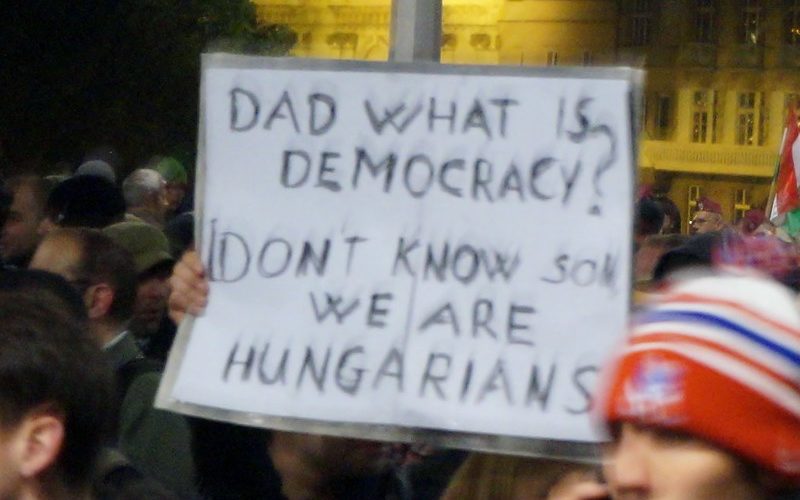The Hungarian right-wing government’s fight against free media in Hungary is daily business, it seems. Since Fidesz’s electoral victory in 2010 and Viktor Orbán’s takeover of the country as prime minister, independent media face an increasingly dire situation. Most media outlets have been closed down or taken over by government sympathizers, and media pluralism is virtually nonexistent in Hungary.
While the restrictive media landscape and the critical state of media freedom in the eastern European country is neither new nor debatable by now, a recent development yet again attracted international attention to the country’s shift to authoritarianism.
Last week, Hungary’s last independent radio station, Klubrádió, was forced off of air, this time, it seems for good. Since Fidesz’ electoral victory in 2010, the radio station has already been attacked multiple times: The Media Council, which was set in place by the Orbán cabinet as a watchdog and to enforce the rules set by the government, threatened to take the station down. Finally, thanks to international pressure, after three years of constant back and forth, the independent radio was saved in 2013, at least temporarily.
Klubrádió’s last fight
In September 2020, the Media Council announced that it would revoke the radio station’s frequency as of February 2021 due to breaches against the Hungarian media law. According to Klubrádió’s director, the violations include “missing deadlines to send reports to the regulator or playing slightly less Hungarian music one day than required by national law”. The breaches were thus neither significant nor related to the station’s aired content. Furthermore, Klubrádió paid each fine related to these infractions, without knowing that these minor breaches could still eventually lead to the forced shutdown of the station. Due to these (relatively insignificant) violations, the Media Council decided not to renew the radio station’s license in September 2020, while those of other, government-friendly stations have been renewed. Klubrádió’s license would therefore expire in February 2021.
The station then appealed to the Budapest Metropolitan Court, accusing the Media Council of discrimination given that other, government-friendly stations have not been fined and penalized for similar infringements.
For the Media Council not to appear biased, Klubrádió’s frequency was subsequently put up for tender, and the radio station was allowed to apply for it. And it did, along with two other stations. Even though the two other radio stations did not meet the formal conditions and were disqualified, they still filed an appeal – hence, the process will drag on for months, at least.
Either way, Klubrádió’s current situation remained rather unpromising: The Fidesz government amended the rules for issuing temporary frequency licenses: according to the new provisions, even if a radio station’s appeal to the Metropolitan Court succeeded, it could not get a temporary license as long as it was still involved in a bidding process for a frequency. And, given that the other stations that competed with Klubrádió for the frequency had filed an appeal, the bidding process is still ongoing, and Klubrádió is hence unable to obtain a temporary license.
However, in February 2021, the Metropolitan Court reaffirmed the Media Council’s decision not to renew Klubrádió’s license. As of mid-February 2021, the radio station will thus only be available on the internet, thereby significantly limiting its reach.
While this move by the Media Council and the Metropolitan Court attracted, once again, international attention to the current critical state of media freedom in Hungary, this is not the first time a government-critic, independent media source has been shut down in the country. Rather, this is just a drop in the ocean and only the most recent incident that exemplifies the restricted state of media freedom in the country and the quasi-authoritarian tendencies of the Fidesz government. Time and again, the government-aligned Media Council went after the radio station and other independent opposition media. One prominent example of his is the daily newspaper Népszabadság, which was closed down in 2016, as well as Magyar Nemzet, which was closed in 2018 and then relaunched as a pro-government newspaper. In addition, independent online media, most prominently Index, suffered from political interference: In 2020, Index Editor-In-Chief Szablocs Dull was fired after openly raising concerns over government interference in the news site’s operations.
After years of Fidesz waging a war against the opposition media that portrayed him and his party critically, media pluralism is virtually nonexistent in the country. Hungary is, for its democratic backsliding, the oppression of media and academic freedom as well as rule of law violations, currently subject to an EU Article 7 procedure together with Poland. The proceedings could potentially lead to the suspension of the EU members’ voting rights. However, it is highly unlikely that the Article 7 mechanism will yield any results: Poland and Hungary are known for coordinating with each other, and neither of them would support the sanctioning of the other by the EU.
Where does all this leave us?
Even though the curtailment of independent media is, unfortunately, by now, common practice in Hungary, the decision to shut down this opposition radio station comes at a critical time. Orbán has recently received some backlash not only from abroad but also at home. Hence, one may assume that further attacks on the freedom of the media would serve his interests, as elaborated by Balogh, former Professor of East European History at Yale University. However, as Balogh explains, it may as well be that in the light of the pressure he faces at home, he found it more beneficial to silence the last critical voices in the country. In addition, considering the current situation due to the COVID-19 pandemic, protests are not expected and could be easily forbidden. Also, the population knows that any breach of the lockdown rules would lead to penalties. Therefore, they are likely to refrain from doing so.
Given that the ongoing Article 7 procedure is unlikely to make any positive progress and the EU lacks other serious enforcement mechanisms to prevent its member’s from democratic backsliding, the outlook is rather grim. In addition, elections in Hungary are only expected in 2022, which gives Orbán just enough time to silence any other critical media and thereby seriously harm the public debate on politics and access to truthful, independent information.
What remains to hope is that international pressure would, once again, save the radio station – which seems to be of little help anyway. Even if the station would get back its frequency, it is guaranteed that the Orbán government will do whatever is necessary to take it down again.
For now, Klubrádió is only available online – and this status will likely continue for some time.
SourcesAnthony, S. (2019): Government recaptures Magyar Nemzet brand, Budapest Business Journal, https://bbj.hu/budapest/culture/history/government-recaptures-magyar-nemzet-brand, accessed 20.02.2021
Balogh, E. (2020): THE ORBÁN GOVERNMENT ONCE AGAIN TRIES TO SILENCE KLUBRÁDIÓ, Hungarian Spectrum, https://hungarianspectrum.org/2020/09/11/the-orban-government-once-again-tries-to-silence-klubradio/, accessed 18.02.2021
Balogh, E. (2021): THE ORBÁN REGIME HAD ENOUGH OF THE GOVERNMENT-CRITICAL KLUBRÁDIÓ, Hungarian Spectrum, https://hungarianspectrum.org/2021/02/10/the-orban-regime-had-enough-of-the-government-critical-klubradio/, accessed 17.02.2021
Balogh, E. (2021): KLUBRÁDIÓ: CONSPIRACY THEORY?, Hungarian Spectrum, https://hungarianspectrum.org/2021/01/25/klubradio-conspiracy-theory/, accessed 19.02.2021
Bariagazzi, J. & Bayer, L. (2021): Slovenia seeks to calm nerves over EU presidency, Politico, https://www.politico.eu/article/slovenia-eu-presidency-council-calm-nerves-anze-logar/, accessed, 19.02.2021
BBC (2016): Hungary’s largest paper Nepszabadsag shuts, alleging pressure https://www.bbc.com/news/world-europe-37596805, accessed 19.02.2021
Dunai, M. (2018): Major Hungarian opposition newspaper to close after Orban victory, Reuters, https://www.reuters.com/article/us-hungary-election-media-idUSKBN1HH10S, accessed 20.02.2021
Gall, L. (2021): Hungary Forces Klubradio Off Air. Shutdown of Independent Radio Station Should Trigger EU Action, Human Rights Watch, https://www.hrw.org/news/2021/02/10/hungary-forces-klubradio-air, accessed 17.02.2021
Gall, L. (2020): Hungary Renews Attacks on Independent Radio Station. EU Should Act on Latest Blow to Press Freedom, Human Rights Watch, https://www.hrw.org/news/2020/09/15/hungary-renews-attacks-independent-radio-station, accessed 17.02.2021
Holesch, A. & Kyriazi, A. (2021): Democratic backsliding as a collaborative project: Understanding the links between Fidesz and Law and Justice, LSE, https://blogs.lse.ac.uk/europpblog/2021/02/05/democratic-backsliding-as-a-collaborative-project-understanding-the-links-between-fidesz-and-law-and-justice/, accessed 19.02.2021
Kahlweit, C. (2021): Letztes Bollwerk, Süddeutsche Zeitung, https://www.sueddeutsche.de/medien/klubradio-ungarn-radio-pressefreiheit-1.5194939, accessed 17.02.2021
Murphy, P, (2021): Top Hungary independent radio forced off air, Yahoo News, https://sg.news.yahoo.com/top-hungary-independent-radio-forced-133600726.html?guccounter=1&guce_referrer=aHR0cHM6Ly9odW5nYXJpYW5zcGVjdHJ1bS5vcmcv&guce_referrer_sig=AQAAAGFVyS12rGjZHNWblhdW09lgSF3sJMdVKRnq4Ia9AnQuuqObGVim8CfYaq9Aed8GvBv15ROKPS-Xt0Y1tz65AiLxDRRJwDRuq-b4nqkxybKXI5PlmY1soh-yAjbP6CAujFld-9I-9uYH6SYdq0FkVDK8fXEt72XxRPojA6_SnzF8, accessed 18.02.2021
Walker, S. (2020): Editor-in-chief fired at Hungary’s leading independent news site, The Guardian, https://www.theguardian.com/world/2020/jul/22/editor-in-chief-fired-hungary-leading-independent-news-site-szabolcs-dull-index, accessed 21.02.2021








Be First to Comment